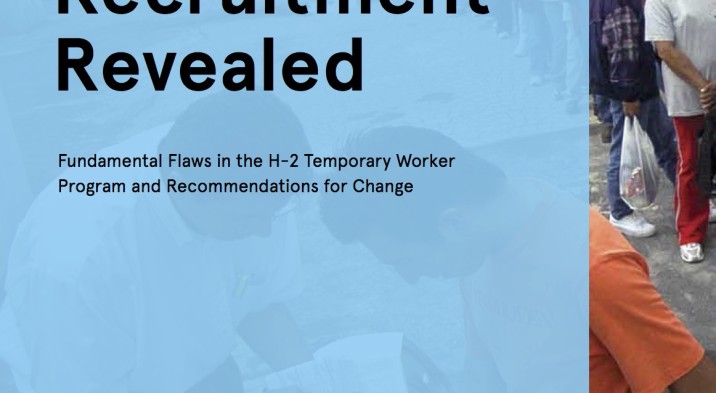
Centro de los Derechos del Migrante, 2014
Executive Summary
This report reveals the reality of international labor recruitment for low-wage, temporary jobs in the United States, examining recruitment in Mexico, home to the largest number of temporary migrants who labor under H-2 visas in the U.S.1 The findings are based on data gathered by Centro de los Derechos Migrante, Inc., (CDM) through a groundbreaking survey and lengthy interviews of hundreds of H-2 workers. The report’s key findings are summarized below.
The Recruitment Process is Fundamentally Flawed
Employers, recruiters and their agents charge illegal recruitment fees and fail to reimburse visa, travel and recruitment-related expenses incurred by workers. Despite bans on recruitment fees in both U.S. and Mexican law, it remains standard practice in Mexico for recruiters to charge workers for their services. Fifty-eight percent of workers surveyed reported paying a recruitment fee to their recruiter. The average recruitment fee charged was $590. Regardless of legal precedent requiring reimbursement for travel, visa, and recruitment costs that reduce wages below the applicable minimum wage, H-2 workers rarely receive reimbursements for the often staggering costs they pay for their jobs in the U.S.
Employers, recruiters, and their agents often misrepresent terms of employment. Recruiters often make false promises to workers about employment conditions in hopes of attracting more workers and charging higher recruitment fees. More than half of workers surveyed did not receive a copy of their job contract.
Recruitment fraud causes economic harm in migrant communities. The lack of transparency in the visa certification process, paucity of government oversight of recruitment activities, and scarcity of information available to workers about their rights puts workers at serious risk for recruitment fraud by con artists posing as recruiters, bona fide recruiters and U.S. employers. One out of every 10 workers surveyed reported having paid a recruitment fee for a nonexistent job.
Workers arrive to the United States in debt. Many workers take out loans, often at high interest rates and using property deeds as collateral. These loans, combined with workplace abuses, may lead to situations of forced labor, debt servitude or human trafficking. Almost half of all workers surveyed reported borrowing money to cover their recruitment costs.